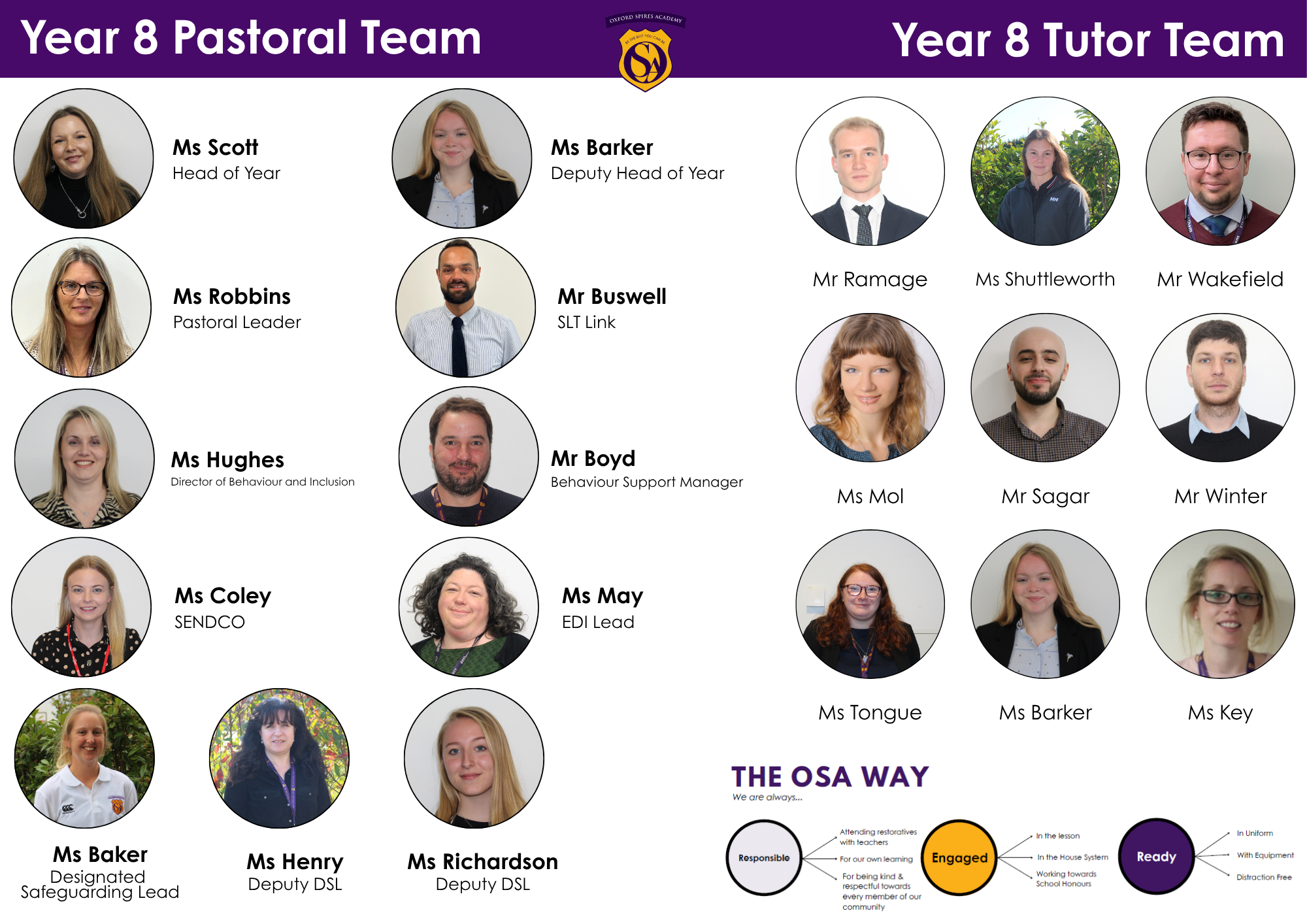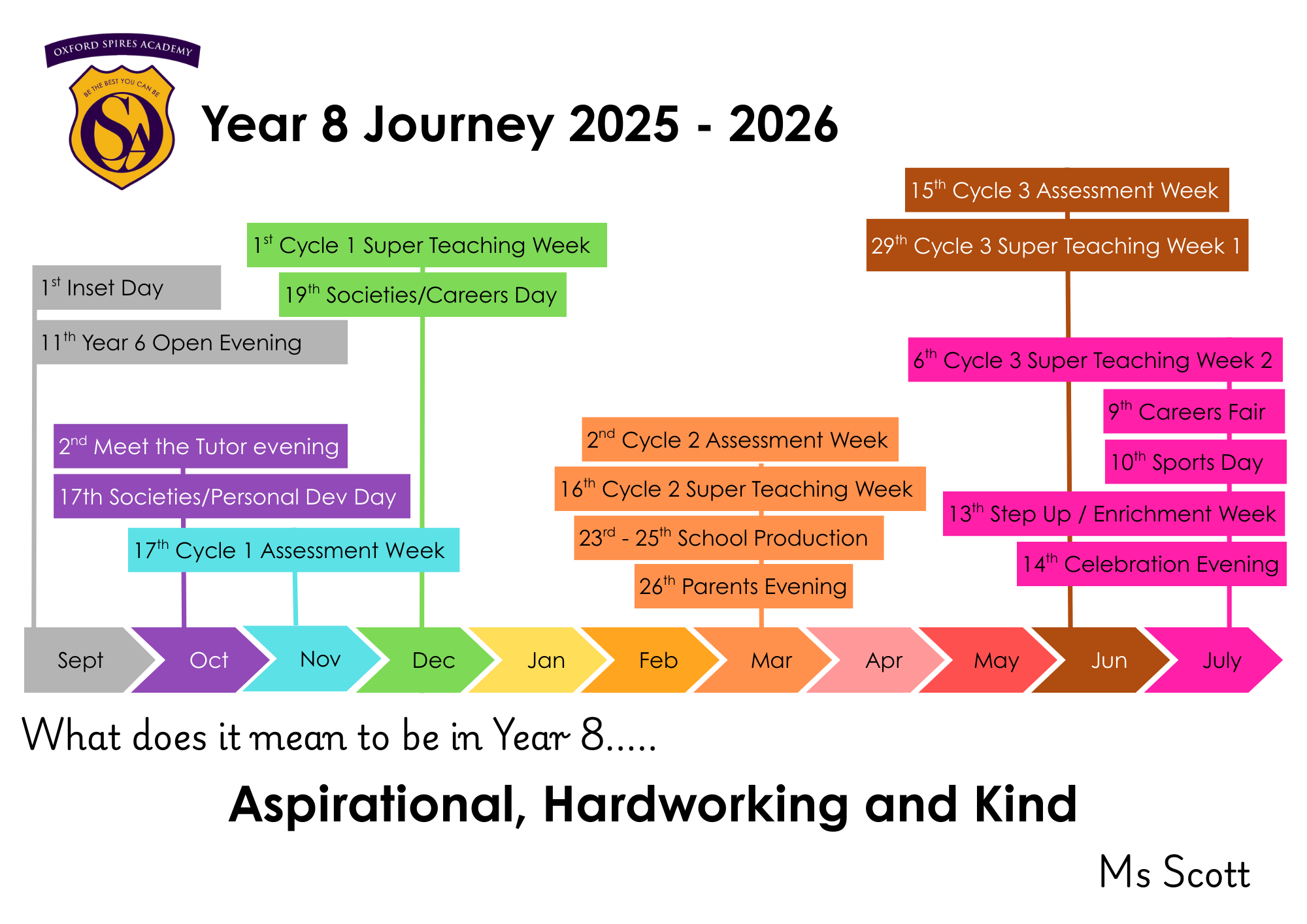Years 7-11
Year 8
This first year at secondary school is a big step up, with lots of interesting subjects to get used to, a different building to explore and new teachers and friends to meet. Our extensive transition programme gives our new students lots of chances to meet us before they start, but we understand that settling in doesn’t always happen overnight, and we support them every step of the way.
Lessons at secondary school are a very different experience to those at primary level. Our teachers are subject specialists with very high standards who want to support our students to realise their potential; working hard, showing resilience and having a positive attitude is key.
Year 8s also have to learn to take more responsibility for themselves with their homework and behaviour than they might be used to. Getting into good habits, and being accountable for their actions, is something our students will be working hard to develop, and we very much appreciate support from parents with this at home.
There are so many exciting opportunities to take advantage of in Year 8, from sports teams, clubs and an extensive range of enrichment activities. We certainly work hard, but we make sure we all enjoy school life too.

Year 8 Curriculum Overview
We believe in a knowledge-centered curriculum which focusses on students acquiring ‘powerful knowledge’ (Young and Muller, 2013, p. 245) across a range of academic disciplines to ensure students have access to a broad and balanced education. Within a knowledge centred curriculum, subjects are taught at gradually increasing levels of complexity leading to deeper knowledge and understanding. We are ambitious for all our students. We have selected the most relevant and important knowledge to be taught across Year 7-9 in order to prepare our students to become successful leaders of their futures. It will also support students to make informed choices about their GCSE study.
Year 8 assessment
Schools are places of learning and achievement. We measure our success by our students’ success. In an ever-growing complex world, our children need the qualifications, skills and tenacity to live happy and fulfilled lives.
In week 11 all students will sit an assessment in each taught subject area. This allows us to measure how well our students are learning the taught curriculum. These results will be reported home to parents and carers.
- All students in Year 7 will have three assessments across the academic year.
- In week 9 of each cycle students will receive a timetable of when each assessment will be held this will also be published below:
Reading & Vocabulary Focus
“The more that you read, the more things you will know. The more that you learn, the more places you’ll go.”
Dr. Seuss (American children’s author, political cartoonist, illustrator, poet, animator, and filmmaker)
Year 8 recommended reading list...
This page is currently awaiting content
Supporting your child in Year 8
By Year 8, our students should be familiar with the routines and organisation of secondary school life and able to get off to a flying start. In our experience they also really enjoy not being the youngest, and we rely on them to support our Year 7s as they settle into their new school.
Please support them in becoming more independent; encourage them to take responsibility planning their homework and remembering their kit, so they can learn to organise themselves. It’s great preparation for later in the school when self-management becomes more critical.
It’s possible that, for some Year 8 students, the novelty might have worn off slightly, and so it’s important to encourage them to stay engaged and continue to throw themselves into all aspects of Oxford Spires life. There are a real range of activities taking place before, during and after school, from sports and performing arts groups to scholars clubs, and it’s certainly true that the more they put in, the more they’ll get out.
Social media use really ramps up in Year 8, and it can be hard for the students – and their parents – to keep it under control. We suggest imposing set limits, such as agreeing a post-9pm watershed after which their screens are out of bounds. Following the advice of e-safety experts across the board, we also recommend that tablets and mobile phones come out of students’ bedrooms at night, so they aren’t tempted into any late-night browsing.
It is also crucial that you encourage your child to think very carefully about what they post online. Please work with us to help them understand how the use of inappropriate language, or comments that could be deemed threatening, racist, sexist or homophobic could impact their future career paths. We will of course deal in school with any issues of this kind which arise, and any student involved will be held to account. All students must focus on communicating positively with each other, whether in person, or online.
It’s equally important for parents to understand what’s going on in the online world, as it changes so quickly – put simply, we need to try and stay one step ahead of our children. We will share the resources that are used to support students in personal development lessons via our school newsletter.
Year 8 is also typically the year when friendships undergo real changes; groups that were established in the students’ first months at the school often dissolve and reform around this time, which some students find difficult to manage. If your child is unhappy or you have concerns about their relationships, please do speak to your form tutor; we want to know, so that we can help.
More generally, if you’re concerned about your child’s anxiety levels or emotional wellbeing, you might find the Young Minds website a useful source of information – but again, speak to us too.
The OSA Cycle
- The academic calendar is split into three cycles of learning.
- Each learning cycle is twelve weeks long.
- Students will following a carefully sequenced and ambitious curriculum during weeks 1-10.
Week 10 - Assessment Week
- All students will sit a formal assessment in week 10.
- Student achievement will be reported back to parents and carers.
Our assessment principles:
- Students are tested on the content taught from the cycle and detailed in the Scholars Guide
-
Section A & B : Knowledge - teacher will read the assessment aloud and using a visualiser
Section A will focus on knowledge taught from the cycle of learning just completed. Section B will focus on knowledge taught in previous cycles in that academic year
- Section C : Application - students will answer independently
Week 12 - Super Teaching Week
What is super teaching week?
Super Teaching Week is where teaching teams use the data from assessment week (Week 10) to identify gaps in knowledge and common misconceptions. Teachers then deliver lessons that target these areas to ensure mastery and edit their schemes of learning for future year groups so that we can teach it BETTER. Each lesson is done in purple pen to show that this is development work and we use a summative sticker in students' books for students to mark the end of each Cycle's learning.
Why is super teaching week important?
At Oxford Spires we passionate that no child should be left behind and Super Teaching Week is the vehicle we use to explicitly ensure all students from all backgrounds, in all subjects, in all classrooms have the opportunity to master and develop their learning. We also believe that no scheme of learning is perfect and we enjoy reflecting and changing our practice for our students. ‘Getting better is the exciting part’.
The OSA Scholar's Guide
Scholar’s Guides are our way of communicating our knowledge rich curriculum to parents and carers and a tool to complement the work done in classrooms every day. Scholar’s Guides develop students to master core knowledge and skills quickly so that teachers can push them further later.
By making knowledge and skills clear via Scholar’s Guides, students and parents can support learning from home, especially when preparing for the week 10 assessments.
Scholar’s Guides can be used by SEND departments and teaching assistants to preteach students who may require it and to target interventions and re teaching effectively. Some students may require more support and scaffolding but Scholar’s Guide means that every student has access to ambitious lessons planned from an aligned, sequenced curriculum and we avoid denial of knowledge!

